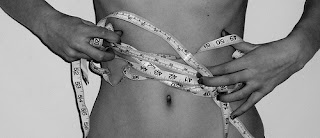From Thinspo to Fitspiration: How Social Media Could Be Affecting Your Body Image
From controversially thin models to the photo retouching used frequently in print ads, the fashion industry is not exactly known for promoting a positive body image for women. In turn, this has led to many efforts, like the Seventeen Body Peace Treaty, to combat these negative messages. This advocacy for body acceptance among women is fantastic and, needless to say, it’s about time!However, is the fashion industry the only culprit for promoting unachievable body perfection? With social media platforms like Tumblr, Pinterest, Instagram, Facebook, and Twitter allowing users to share images and ideas at a whim, it’s possible that everyday users like you and me could be causing the most harm to our own body image.
Below, I will touch on some of the growing concerns about different social media platforms, and the effects they could be having on your body image:
Tumblr
On Tumblr, users can find images by searching for tags (keywords that describe the image), which makes finding specific types of photos easy. However, some argue that this tagging system could be detrimental to young girls’ body images. Healthy is the New Skinny explains,
“By searching terms like ‘thinspo’ (short for ‘thinspiration’ or thin inspiration) or ‘proana/promia’ (short for pro-anorexia and pro-bulimia) girls can be overwhelmed with images of too thin models, fasting and purging updates, and promotion of a negative body image.”Some bloggers use Tumblr exclusively to promote extreme thinness and to motivate themselves and others to achieve unhealthy weights. It is not uncommon to find a Tumblr blog with entries promoting anorexia, bulimia, and other harmful body disorders.
These blogs are often diary-like, thus giving readers very personal insights into the life of a girl struggling to be slim. The Huffington Post interviewed some of the girls that operate Tumblr “thinspo” blogs and here is what one of the girls, Anonia, had to say, about the photos she blogs:
“They look so confident and we can see their bones through their skin. It’s the most beautiful thing ever. I also like tips about food or how to ignore hunger.”Strong advocates of Tumblr often praise the site for providing teens with a safe online community to cope with their real-life problems. However, there has been growing concern about Tumblr blogs that promote a negative body image and eating disorders.
In fact, last year Tumblr announced that it would no longer allow users to post content that promotes self-harm and that the site would show public service announcements when users searched for potentially harmful tags such as “pro-ana.” It seems as though this would be the perfect solution to this harmful behavior, however, a quick search on Tumblr proves that these blogs are still around and thriving.
Fitspiration (fitness+ inspiration) are images of women engaged in a fitness activity and are usually accompanied by a motivational saying. The purpose of these images is to motivate the poster to pursue a healthier lifestyle or inspire them to work out in order to achieve a more fit body. So, what’s the big deal?
Well, some argue that fitspiration is just thinspiration with the facade of a healthy lifestyle thrown in. Fox News Magazine explains that the main problem with these images is that they still tell women there is only one kind of body that should be valued, which can be dangerous. Additionally, these images can also fuel an obsession with one’s body, which can lead to the same type of problems facing the promoters of pro-ana and thinspo images.
On the other hand, some argue that not all fitspiration promotes a negative body image. Everyday Feminism explains that there are different types of fitspiration and good fitspiration can motivate women to pursue a healthy lifestyle and actually achieve body peace.
The problematic aspect of Facebook is that, in general, the photos making people feel insecure are of people they know. This is a stark difference from the edited ads of fashion magazines, the professional fitness women of Pinterest, and the Tumblr pictures of women you have never met. Because of this, it’s possible that Facebook fosters a sense of competition among women and friends, and can have the same negative effects as Tumblr and Pinterest on a woman’s body image.
Your Thoughts?
This is a controversial issue that can only be solved by encouraging open dialogue among women. And, what better place than here at College Fashion? I encourage you to click the links in the post and read more information on this growing problem. In the meantime, here is some food for thought:- Even if all the harmful blogs could be eliminated from Tumblr, would that really change the mindset of the girls promoting this behavior? What’s stopping them from moving to the next social media platform with more lenient content rules?
- Is Pinterest “fitspiration” a spin off of the more harmful “thinspo” trend, or does it simply motivate women to pursue a healthy lifestyle?
- Do you think Facebook fosters a sense of competition by allowing people to stalk photos and constantly compare their looks against others? Do Facebook users encourage this behavior?
- Can anything be done about these problems and should anything even be done at all? If so, what?




No comments:
Post a Comment